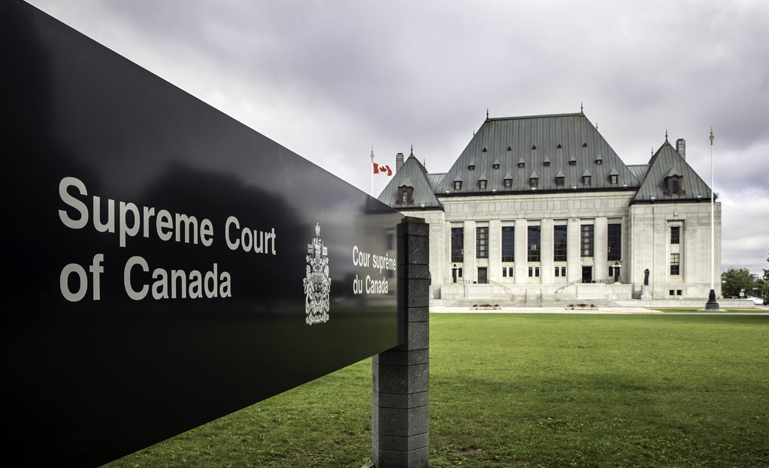Cruel and unusual punishment
The Supreme Court will weigh in on whether a legal entity can invoke section 12 of the Charter.

The history of human rights law can be summed up through our attempts to answer just one question: who (or what) is ‘human’ enough to have rights?
Society changes, and the way we answer that question changes with it. Today we debate the rights of animals; in future, we may be grappling with the legal status of artificial intelligence. And in the meantime, the courts will be working to draw a bright line around the rights and responsibilities of non-human “legal persons” — private companies, corporations, non-profits.
Back in the spring, the attorney general of Quebec filed an appeal with the Supreme Court of Canada of a Quebec Court of Appeal ruling in the case of a contractor fined under the provincial Building Act for carrying out construction work without the proper licence. Section 197.1 of the Act allows for two classes of mandatory fines: lower ones for human beings (“natural persons”) and higher ones for legal persons.
The contractor challenged the range of fines outlined in the Act, arguing it violates its right as a ‘person’ to be protected from “cruel and unusual treatment or punishment” under s. 12 of the Charter of Rights and Freedoms. At trial, the court set aside the constitutional question and concentrated on the fine itself. Since the minimum fine was neither cruel nor unusual, the court concluded, the question of whether a private company could invoke s. 12 was moot. The court found the contractor guilty and applied a $30,843 fine.
On appeal, the Quebec Superior Court agreed with the lower court ruling — and also asserted that legal persons can’t avail themselves of the protection of s. 12. But then the Court of Appeal weighed in, leaving the question of whether the fine itself constituted “cruel and unusual punishment” to the lower courts while opening up the prospect of legal persons enjoying rights under s. 12 — under certain very limited conditions.
In doing so, the majority on the Court of Appeal held that private companies, corporations, and non-profits can “suffer” in ways that engage Charter rights.
“A legal person, or ‘moral person’ as we say in Quebec law, is a legal fiction,” says Tommy Tremblay, a Montreal-based commercial and competition law practitioner with Langlois. “The Court of Appeal decided that s. 12 does apply to legal persons in exceptional circumstances.
“It’s important to note that the court did not decide whether those circumstances applied in this case. But it did talk about what those circumstances could be.”
The appeal court stated that legal persons can suffer from cruel and unusual punishment to the degree that their corporate discomfort leads to suffering for flesh-and-blood people. In other words, a punitive fine that leads to layoffs or bankruptcy, or compromises the stability of an employee pension plan, could engage a company’s rights under s. 12.
“The sole question before the Court of Appeal was whether s. 12 can apply to legal persons,” says Audrey Boctor, a partner at IMK in Montreal with a background in both commercial and constitutional law. “The SCC’s decision may, of course, have broader implications.”
Which way might the Supreme Court jump? Canadian courts have set the bar very high for declaring fines or forfeitures to be in violation of s. 12. In fact, according to the Department of Justice website, it’s happened only once — in R. v. Boudreault, when the SCC struck down the mandatory victim surcharge. Knowing that fact doesn’t answer questions about legal persons’ access to s. 12, but it does suggest the courts have tended to regard “cruel and unusual punishment” as something that happens to actual people (in the Boudreault case, to low-income offenders).
“In the context of S. 12, one of the core considerations in the case law has been whether the punishment is compatible with the idea of human dignity,” says Boctor. “At the same time, the scope of criminal liability borne by corporations has been expanding, and that’s a factor that may cause the interpretation of s. 12 to evolve.
“The majority on the Court of Appeal pointed to the component of public interest in the decision to levy a monetary penalty on a private company. If the fine is totally disproportionate — and is also so onerous as to put the company out of business and cause the loss of numerous jobs — that has to be taken into account.”
It’s not hard to see a slippery slope argument here: how meaningful is a human right when it’s shared with corporations? Boctor points out that if a fine has to be “exceptional in normal circumstances” before it engages the s. 12 right (“normal” in this case meaning it’s being applied to a natural person), it would have to be “more than exceptional” to trigger s. 12 when applied to a legal person.
“I think that if the SCC allows s. 12 to apply to legal persons, it will set the bar quite high,” she says.
Tremblay says he trusts the Supreme Court to extend the right to legal persons just enough to protect natural persons — to affirm that if corporations enjoy the protection of a human right, it’s only to the degree that their problems are our problems.
“A corporation may be a legal fiction, but it’s not disembodied — its actions have effects in the real world,” he says. “Its material aspect arises in how it affects the lives of employees and contractors. In a very real sense, a corporation can ‘suffer’ in terms of how real people are affected by it.”


